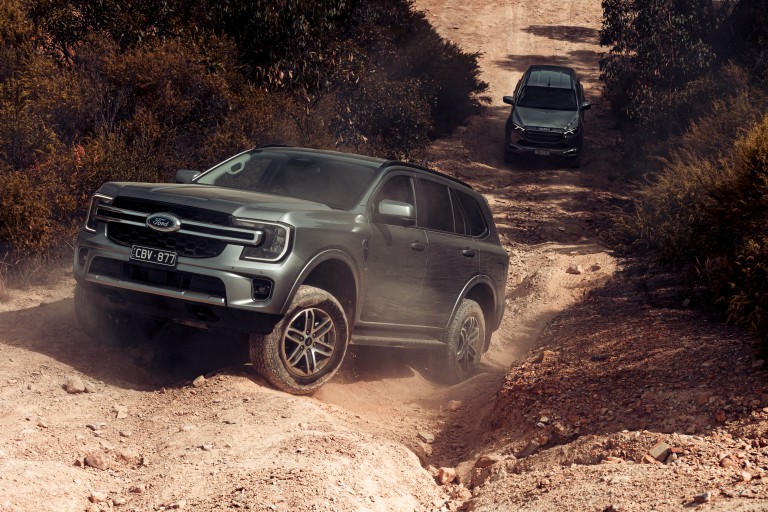
While the mid-size 4x4 wagon segment continues to be dominated by the Toyota Prado, the minor placings are looking a bit more exciting in 2023.
Isuzu’s MU-X was consistently the second-best seller behind Prado, and in 2022 it finished the year with 10,987 sales to Prado’s 21,102. In third place for the segment was the Ford Everest; it tallied 10,313 sales with just a few months of the new model included.
In January ’23 the Everest jumped to the top of 4x4 wagon charts, shifting 1230 units to the Isuzu’s 828 and Prado’s 1182. Are we seeing a shift in the wagon segment, or is the success of the Everest just the momentum of a new model?
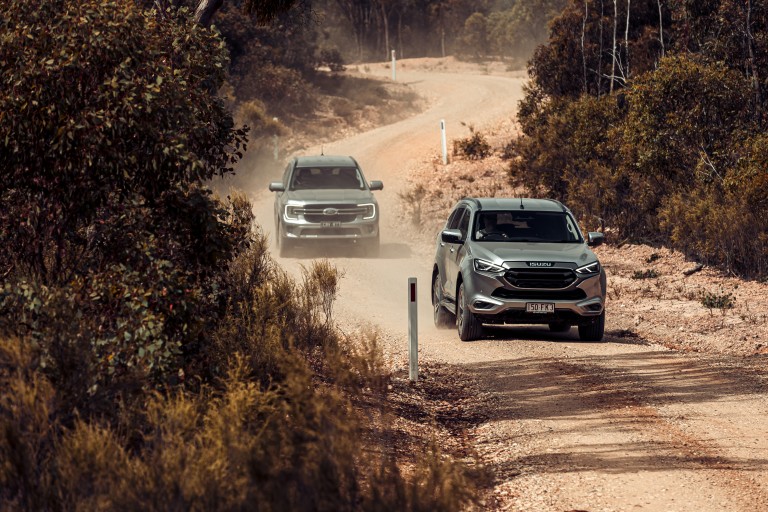
We lined the Everest V6 up with the Prado a few months back and found them to be very evenly matched and hard to pick apart. This time we have the Everest Trend with the 2.0-litre four-cylinder engine and pitted it against the Isuzu MU-X in top-spec LS-T guise.
The Trend is the highest spec Everest you can get with the four-cylinder engine and starts at $65,290 (+ORC) in 4x4 trim. The MU-X LS-T comes with a drive-away price of $65,990 and is only offered with the 3.0-litre four-cylinder engine, so the two are a good match on price.
JUMP AHEAD
- What you get
- On-road performance
- Off-road performance
- Towing
- Safety
- Ownership
- Practicality
- VERDICT
- Scoring
- Full specs
What you get
As high-spec models, both of these seven-seat wagons come very well-equipped for family use.
As the newer model here, let’s start with the Everest Trend. The Trend is the second of four models in the 2023 Everest line-up, but the highest spec with the four-pot engine. That engine is the 2.0-litre dual-turbocharged, diesel-fuelled mill that produces a healthy 500Nm and 154kW.
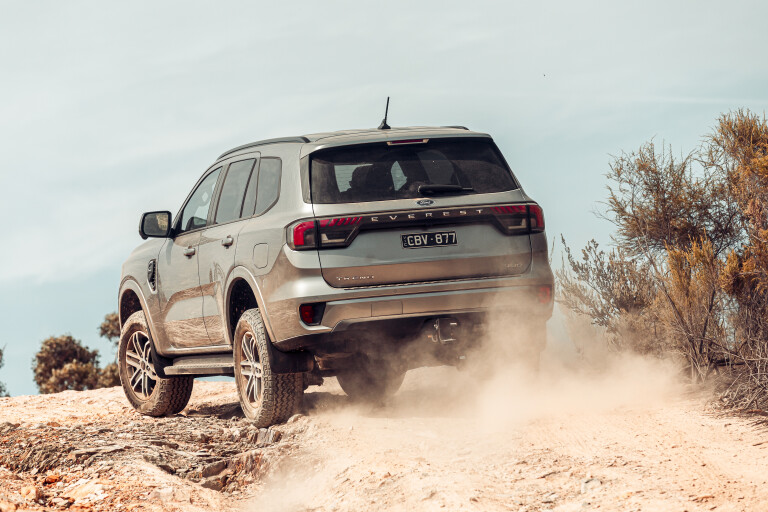
The engine is backed by Ford’s 10-speed automatic transmission which was heavily revised for this latest model, and a four-wheel drive system that offers conventional two-wheel drive, full-time 4x4 for all-wheel drive on any road surface, locked 4x4 high range, and locked 4x4 low range. There are six drive modes for various road conditions and a rear differential lock for when the off-roading gets real tough. The Everest Trend rides on 18-inch alloy wheels and 255/65R18 all-terrain tyres.
Inside, all seven seats are leather-covered with power adjustment for the driver's seat (eight-way) but no heating or ventilation on any of them.
The 12-inch portrait-style centre screen houses the infotainment, sat-nav and off-road functions. Apple CarPlay and Android Auto can be wired or wireless, and there’s a wireless charging pad for compatible phones. The eight-inch digital gauge screen is configurable to show your favourite information but misses out on a tyre-pressure monitoring system which only comes with the Everest Platinum.
Everest: Factory extras fitted
| Prestige paint | $675 |
| All-terrain tyres | $500 |
| Touring pack | $1950 |
| Towing pack | $1700. |
It should be noted the Everest’s towing pack includes not just the towbar but also a 12-pin plug, integrated electronic brake controller and Ford’s excellent electronic towing modes and aids via the big screen.
Stepping into the Isuzu MU-X LS-T and the 3.0-litre diesel engine with a single turbocharger makes 450Nm and 140kW. It is backed by a six-speed automatic transmission and a part-time 4WD system that gives the driver 2WD, 4x4 locked high range and 4x4 locked low range.
The Isuzu offers no setting for AWD on sealed or firm road surfaces. The single drive mode in the MU-X is the ‘Rough Terrain’ button which effectively sharpens up the electronic traction control for off-road use. A locking rear differential is standard on the MU-X.
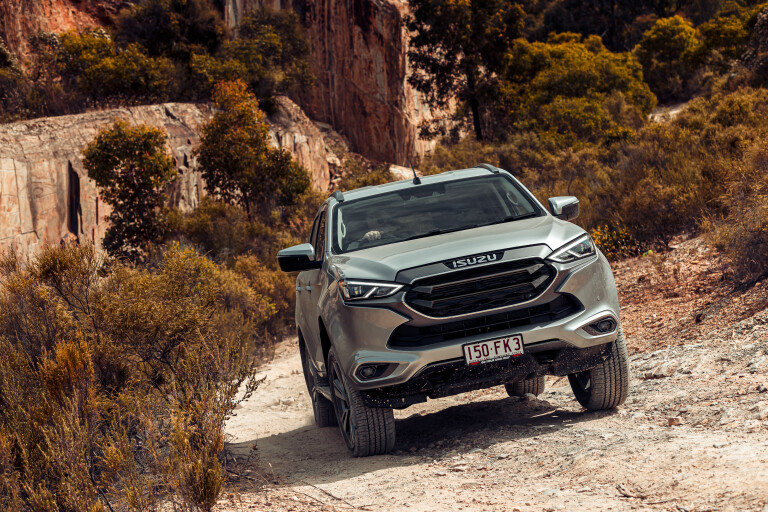
The LS-T’s alloy wheels measure 20 inches in diameter and are fitted with 265/50R20 highway tyres and a TPMS, which is exclusive to the LS-T in the three-model MU-X range. Both cars tested here have power tailgates, but the Isuzu’s gate is slower in operation.
Inside, the MU-X is a huge step up from the previous generation and it is well-equipped. All the seats are leather-covered, plus the front seats have a heating function but no ventilation. Both the front seats have power adjustment with eight-way adjustability for the driver and four-way for the passenger.
The MU-X infotainment screen measures nine inches, which against any other car would be deemed sufficient but seems small when compared to the Ford’s 12-inch screen. Screen envy is a thing, apparently. Apple CarPlay can connect wirelessly but you need a cable to hook up Android Auto or for charging with either system.
MU-X: Factory extras fitted
| Tow bar kit | $1,182.25 |
| 12-pin plug | $393.25 |
| Electronic brake controller | $896.05 |
| Rubber mats | $241.67 |
| Premium paint | $650. |
These extras take the LS-T’s drive-away price as tested up to $69,488.
On-road performance
Despite being close to each other for the purpose of design, price and features, the distance between these two cars starts to show once you get behind the wheel. The MU-X feels older than its two-year difference to the Everest, not only with its big screen and technology but also in the way it drives.
The Isuzu feels much closer to its light commercial vehicle (LCV) roots, which it shares with its D-MAX ute sibling, than the Everest which, derived from the Ranger ute, is leaps ahead in terms of performance, refinement and driveability.
Isuzu’s 3.0-litre engine always lets you know it’s a diesel, whereas the Ford’s mill is quieter and more refined. Refinement is also the key difference between the way the respective transmissions perform, with the 10-speed in the Ford doing its thing seemingly unnoticed, while the MU-X six-speed transmission is more aggressive in its shifts.
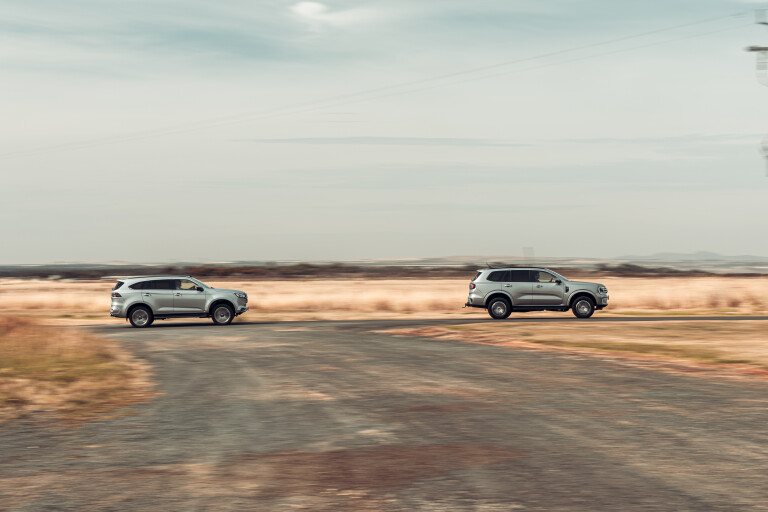
Points against the Ford for the tiny and fiddly thumb buttons on the right side of the gear shifter, which you’re expected to use for manually selecting ratios in the transmission. The Isuzu allows you to tap the shifter across to the right and select gears using fore and aft movements, which is much more natural and easy to do without having to look down at the shifter. This is especially useful when driving off-road or towing.
Despite having 50 per cent larger engine capacity, the Isuzu is also left behind under acceleration and genuinely feels lacking in power and torque when compared to the newer breed of diesel engines. That’s the difference of a more modern design employing a bi-turbo set-up for optimal performance.
Hate to sound like we’re beating up on the MU-X here, but it can’t take a win in terms of driveability. Its suspension reveals its LCV heritage despite also having a coil-sprung rear axle and softer setting than the D-MAX ute.
It bounces the occupants around in the cabin, while the Everest remains smooth and composed on rough roads. The Ford’s ride can feel a bit choppy over high-frequency bumps on-road, but it’s barely noticeable most of the time.
Off-road performance
The MU-X crawled back some credibility on a nasty little off-road pinch we use to test wheel travel and tractive abilities. The deeply rutted track takes axle articulation beyond its limits and hoicks the front wheel in the air, testing out the ETC and the rear diff lock.
With its rugged-terrain button and diff lock engaged, the Isuzu felt to have a little more articulation in its rear axle than the Ford did, allowing it to squat down and get the drive to the ground and push the car onwards. Both cars scrambled for traction here, but the MU-X less so, even on its low-profile tyres. ‘Ruts’ mode and RDF were selected for the Everest.
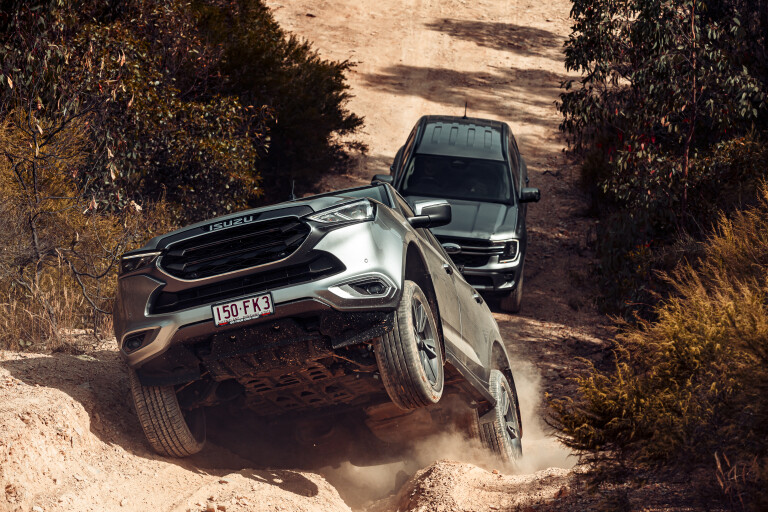
Both vehicles scraped their driver-side side-step against the bank, but the MU-X more so – the Everest barely rubbed against it. Both crested the climb, but the Isuzu was more composed, even if it did scrape harder on its step.
Another plus for the Isuzu when off-road is that the underbody protection plates are made of metal and extend right back underneath the fuel tank, to protect against rocks and scrapes.
The Everest carries its on-road composure over to rough, potholed gravel tracks, where it is sure-footed and never steps out of line. On these same tracks, the MU-X’s rear suspension is more inclined to step out of line when crossing bumps or corrugations.
Off-road specs
| Ford Everest Trend | Isuzu MU-X LS-T | |
|---|---|---|
| Approach angle | 30.2° | 29.2° |
| Rampover angle | 21.9° | 23.1° |
| Departure angle | 23° | 26.4° |
| Ground clearance | 226mm | 235mm |
| Wading depth | 800mm | 800mm |
Towing
Both the Everest and MU-X have rated towing capacities of 3500kg, which is the maximum for this type of standard vehicle. The MU-X advertises a GCM of 5900kg, while it’s 6250kg for the Everest Trend 2.0 – but you have to take into account the Everest is a heavier vehicle overall.
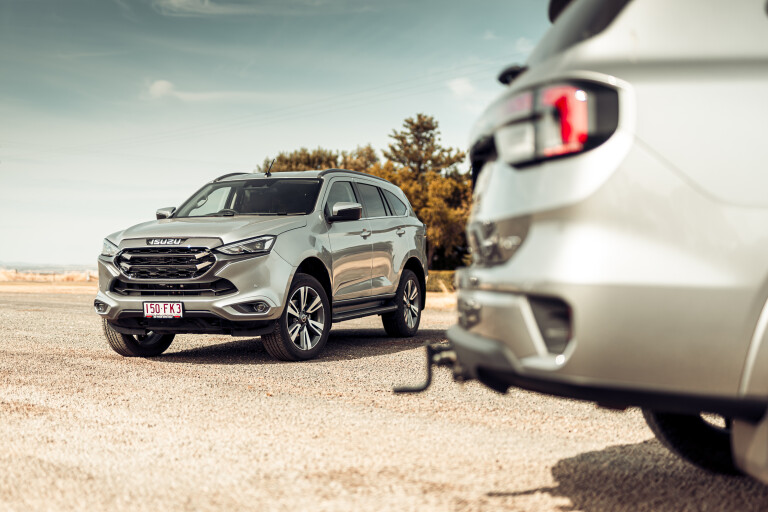
Countering this is the fact the Ford has a higher GVM; although, it does have a lower payload than the Isuzu. Owners will need to do their sums if they are thinking about pushing any of these weight limits with either on-board load or a trailer.
While we haven’t towed with these two wagons, we have towed with their respective ute siblings and with the same 2100kg ’van behind each of them. In that test the Ford’s powertrain pulled the load much better than the Isuzu’s, while the latter’s transmission was much better for manual shifting.
The towing tech that comes in both the Ranger and Everest is unsurpassed in the market and a bonus for those who tow, no matter their level of experience.
Safety
Both of these vehicles have a five-star ANCAP safety rating and include all the important features such as AEB, ESC, ABS, blind-spot indicators, rear cross-traffic alerts, lane-keeping assist, and enough airbags to build a jumping castle. Only the MU-X has TPMS, which is only available with the top-of-the-range LS-T variant.
As we’ve found when driving late-model Isuzus in the past, the calibration of these safety/assistance features is very sensitive to the point where they can be intrusive and you want to turn them off.
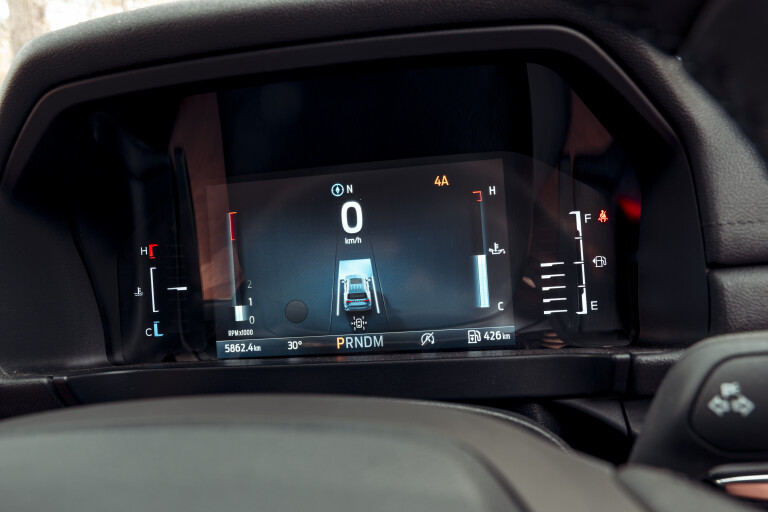
Case in point: When driving in traffic in this MU-X, AEB was applied even though I had my foot on the brake pedal and was a safe distance from the moving car ahead. The AEB actually pulled the brake pedal from below my boot which I felt increased the braking distance, even though a full stop was not required.
The safety systems in the Everest are far less intrusive, simply doing their job when they are needed and notifying you of traffic around the vehicle when required.
Ownership
The MU-X comes standard with a six-year/150,000km warranty and seven years roadside assistance, provided you service the car at an Isuzu dealer. To further entice you to do that, Isuzu offers capped-price servicing for the first seven scheduled services in line with the Scheduled Service Intervals.
Across at the Blue Oval you’ll get a five-year/unlimited kilometre warranty with roadside assistance for up to seven years. Service cost of $329 for the first four general services for up to four years or 60,000km, whichever occurs first. Check the fine print on each of these brands for total costs, as they do not cover everything.
Practicality
Both of these wagons are reasonably spacious inside, have good off-road potential, moderate payloads and healthy towing capacities, so they make great family touring 4WDs.
The MU-X has always offered one of the bigger interiors in the class, but the Everest has caught up with it with the latest model. The Ford has more front seat space but sacrifices in the second row, where passengers have more legroom in the Isuzu. The Isuzu also offers a bigger gap for entry and exit to the third-row seat for the kids.
Both cars have similar payloads and the same 3500kg towing capacity, but the Ford has a higher GCM.
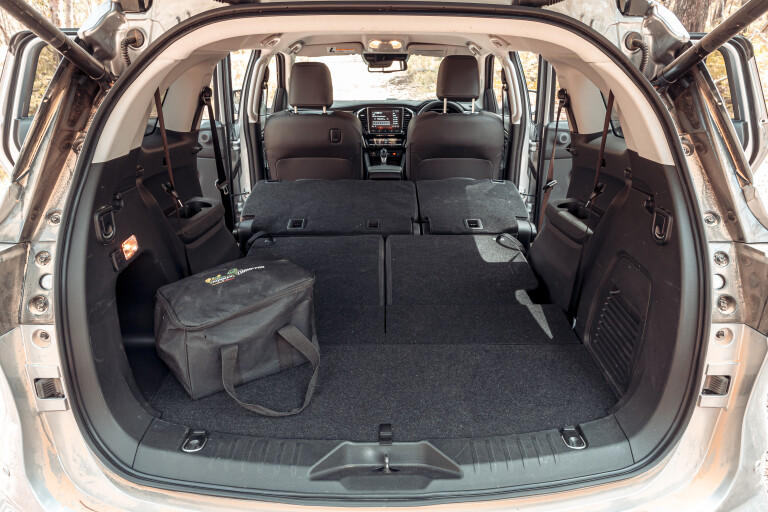
The MU-X’s 20-inch wheels and low-profile tyres are not suited for Australian tracks, but there’s nothing stopping owners from fitting the 17s from a lower grade model or the aftermarket. This will improve ride quality and durability. The Everest will also happily ride on 17s.
The manufacturers of both wagons quote the wading depth of the vehicles at 800mm, but they both have forward-facing engine air intakes directly above the headlight where they could easily take in a gulp of H2O on a river crossing. Extra care should be taken here or, better still, look into fitting a quality intake snorkel.
As popular models with many components shared with their respective ute siblings, both the Ford and Isuzu are well-supported by the 4x4 aftermarket, allowing owners to build a touring vehicle to suit their adventures.
Verdict
If the MU-X LS-T was at least $5K cheaper than the Everest Trend, this would be a closer race; but as they are similar in price and equipment, the Ford is a clear favourite here.
"The Everest is leaps ahead in terms of performance, refinement and driveability"
The performance, refinement, dynamics and the level of technology in the Everest all make it a more comfortable and enjoyable vehicle to be in, whether that is as a driver or a passenger. This is evident both on- and off-road, on the highways and around town.
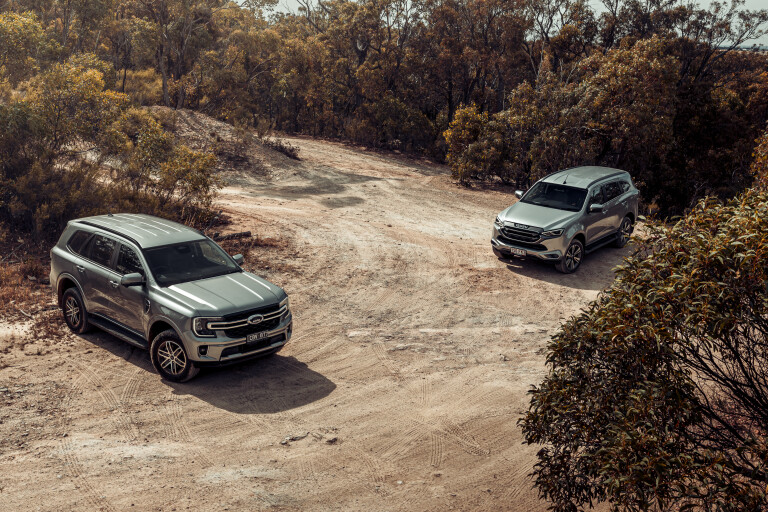
While some of the Everest’s advantages could be attributed to it being a newer model, it really is a generation ahead of the MU-X and everything else in that mid-size 4x4 wagon class.
Ford has raised the bar with its next-gen Everest and Ranger models and it’s now up to the other manufacturers to play catch up, let alone surpass the Australian-engineered Fords.
Scoring
Ford Everest Trend: 9.0/10
+ Performance
+ Cabin technology
+ Dynamics
- Small shift buttons
- No TPMS
- Rear seat legroom
Isuzu MU-X LS-T: 7.0/10
+ Interior space
+ Level of safety kit
+ Metal underbody protection
- Performance
- NVH level
- Ride quality
Specs
| Ford Everest Trend | Isuzu MU-X LS-T | |
|---|---|---|
| Price | $65,290 (+ORC) | $65,990 (Drive-away) |
| Engine | I4 diesel | I4 diesel |
| Capacity | 1996cc | 2999cc |
| Max Power | 154kW at 3750rpm | 140kW at 3600rpm |
| Max torque | 500Nm from 1750 to 2000rpm | 450Nm from 1600 to 2000rpm |
| Transmission | 10-speed automatic | 6-speed automatic |
| 4x4 system | 2WD, full-time 4WD, 4x4 high and low range | Part-time, dual-range 4x4 |
| Crawl ratio | N/A | 33.3:1 |
| Construction | 5-door wagon on ladder chassis | 5-door wagon on ladder chassis |
| Front suspension | IFS w/ upper and lower arms and coil springs | IFS w/ upper and lower arms and coil springs |
| Rear suspension | Multi-link live w/ coil springs and Watt’s linkage | 5-link live w/ coil springs |
| Tyres | 255/60R18 | 265/50R20 |
| Weight | 2274kg | 2175kg |
| GVW | 3000kg | 2800kg |
| GCM | 6250kg | 5900kg |
| Towing capacity | 3500kg | 3500kg |
| Payload | 726kg | 750kg |
| Seats | 7 | 7 |
| Fuel tank | 80L | 80L |
| ADR fuel claim | 7.2L/100km | 8.3L/100km |
| On-test fuel use | 11.3L/100km | 11.9L/100km |
| Approach angle | 30.2° | 29.2° |
| Rampover angle | 21.9° | 23.1° |
| Departure angle | 23° | 26.4° |
| Ground clearance | 226 | 235mm |
| Wading depth | 800mm | 800mm |



COMMENTS